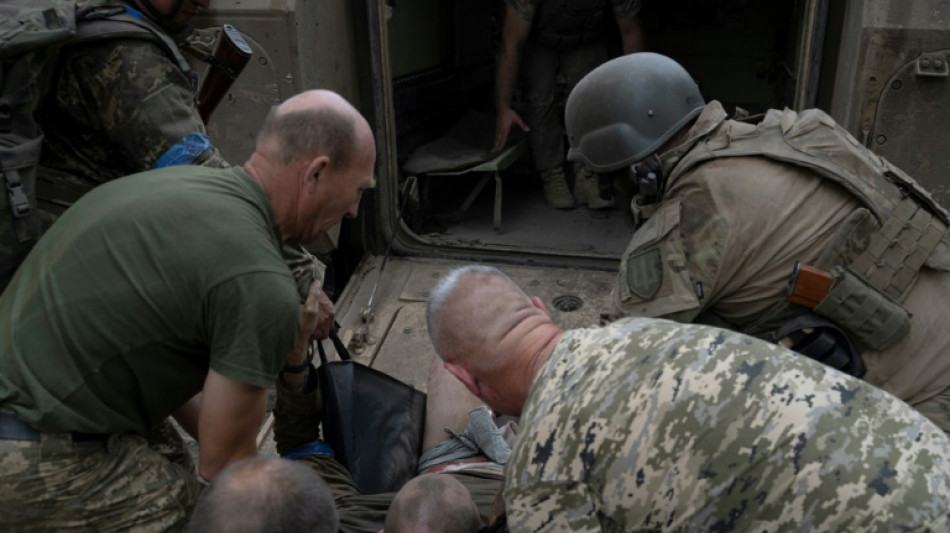
-
 Scandic Trust Group strengthens sales network with First Idea Consultant
Scandic Trust Group strengthens sales network with First Idea Consultant
-
Stocks slip as investors weigh earnings, tariffs

-
 Police say 19 held after raid at Swedish start-up Stegra to be deported
Police say 19 held after raid at Swedish start-up Stegra to be deported
-
Kante returns as France seek to clinch World Cup berth
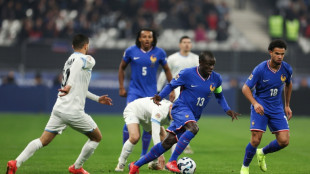
-
 Marcus Smith starts at full-back as England ring changes for Fiji
Marcus Smith starts at full-back as England ring changes for Fiji
-
Kolisi 100th Test 'no distraction' for Erasmus' South Africa
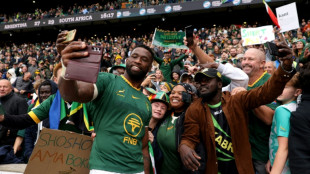
-
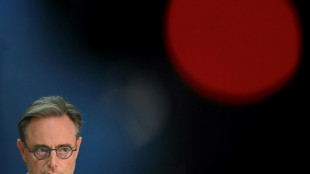 Teetering Belgian government given more time to agree budget
Teetering Belgian government given more time to agree budget
-
Merz backs EU plan to protect steel sector from Chinese imports
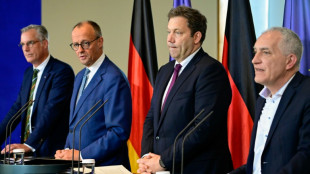
-
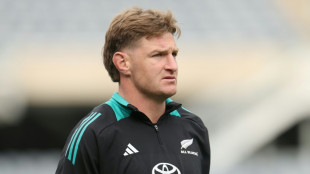 New Zealand make Scotland changes after Barrett brothers' injuries
New Zealand make Scotland changes after Barrett brothers' injuries
-
'Roy of the Rovers story' -- Farrell handed Ireland debut for Japan Test

-
 Stones backs Man City team-mate Foden to pose England dilemma for Tuchel
Stones backs Man City team-mate Foden to pose England dilemma for Tuchel
-
Djokovic to face Alcaraz in ATP Finals groups
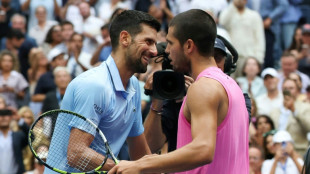
-
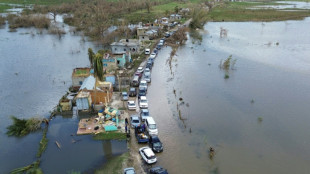 Facing climate 'overshoot', world heads into risky territory
Facing climate 'overshoot', world heads into risky territory
-
Springbok skipper Kolisi to play 100th Test against France
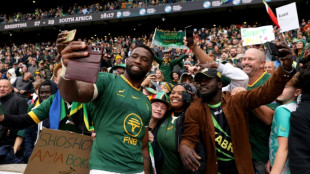
-
 Bank of England leaves rate unchanged before UK budget
Bank of England leaves rate unchanged before UK budget
-
Germany recall Sane, hand El Mala debut for World Cup qualifers
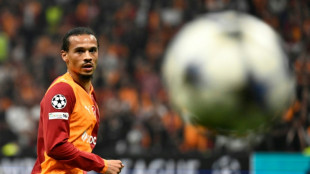
-
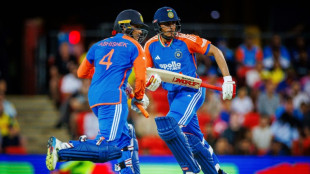 India thump Australia to take 2-1 lead in T20 series
India thump Australia to take 2-1 lead in T20 series
-
Cameroon's Biya, world's oldest president, sworn in for 8th term
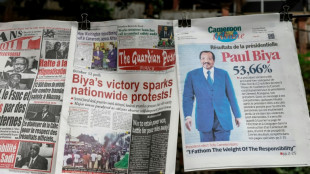
-
 Flick holding firm on Barca high line despite defensive woes
Flick holding firm on Barca high line despite defensive woes
-
Battered US businesses eye improved China trade at Shanghai expo

-
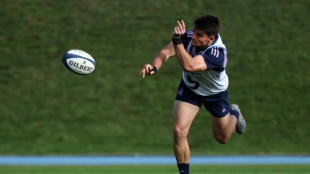 France opt for Le Garrec as Dupont replacement for 'best team ever' South Africa
France opt for Le Garrec as Dupont replacement for 'best team ever' South Africa
-
Drugmaker AstraZeneca profit jumps as US business grows

-
 'Vibe coding' named word of the year by Collins dictionary
'Vibe coding' named word of the year by Collins dictionary
-
Vietnam evacuates thousands from coast ahead of Typhoon Kalmaegi
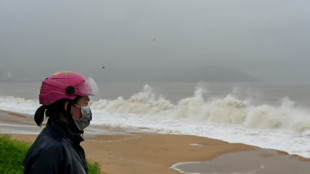
-
 European stocks fall after gains in Asia, US
European stocks fall after gains in Asia, US
-
MotoGP legend Agostini admires Marc Marquez's 'desire to win'

-
 Nepal searches for avalanche victims
Nepal searches for avalanche victims
-
Hezbollah rejects any negotiations between Lebanon and Israel

-
 Chapman blitz leads Black Caps to tight T20 victory over West Indies
Chapman blitz leads Black Caps to tight T20 victory over West Indies
-
France urges EU to sanction Shein platform

-
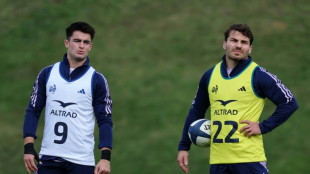 France opt for Le Garrec as Dupont replacement for South Africa Test
France opt for Le Garrec as Dupont replacement for South Africa Test
-
Turmoil in tiaras at Miss Universe pageant in Thailand

-
 Probe into Thales defence group looking at Indonesian contract
Probe into Thales defence group looking at Indonesian contract
-
US to cancel flights as longest govt shutdown drags on
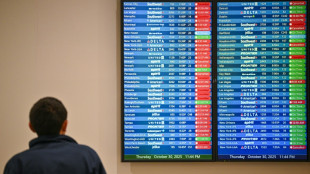
-
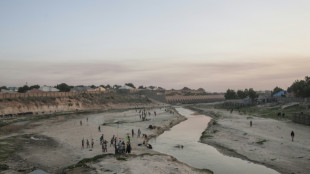 Home in Nigeria, ex-refugees find themselves in a war zone
Home in Nigeria, ex-refugees find themselves in a war zone
-
Doncic's Lakers hold off Wembanyama's Spurs, Blazers silence Thunder
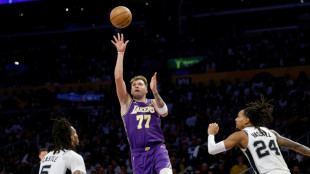
-
 For Turkey's LGBTQ community, draft law sparks existential alarm
For Turkey's LGBTQ community, draft law sparks existential alarm
-
Musk's $1 trillion pay package to face Tesla shareholder vote
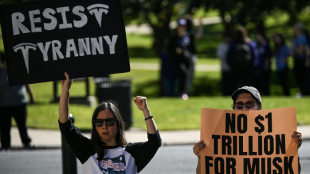
-
 Tonga rugby league star out of intensive care after seizure
Tonga rugby league star out of intensive care after seizure
-
Argentine ex-president Kirchner goes on trial in new corruption case

-
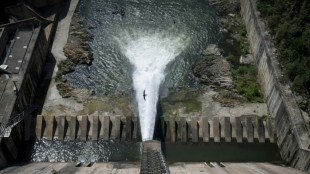 Dams, housing, pensions: Franco disinformation flourishes online
Dams, housing, pensions: Franco disinformation flourishes online
-
Endo returns as Japan look to build on Brazil win

-
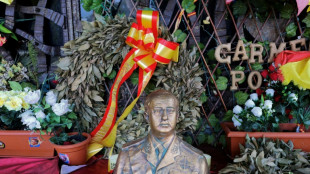 Franco captivates young Spaniards 50 years after death
Franco captivates young Spaniards 50 years after death
-
German steel industry girds for uncertain future
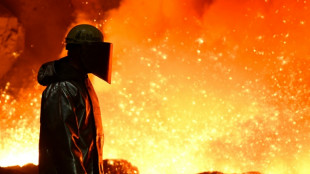
-
 IPL champions Bengaluru could be sold for 'as much as $2 billion'
IPL champions Bengaluru could be sold for 'as much as $2 billion'
-
Budget impasse threatens Belgium's ruling coalition

-
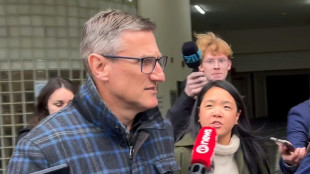 New Zealand ex-top cop admits to having material showing child abuse, bestiality
New Zealand ex-top cop admits to having material showing child abuse, bestiality
-
BoE set for finely balanced pre-budget rate call

-
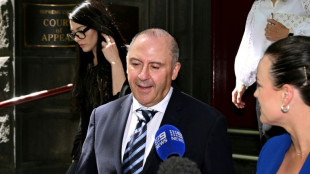 Australian kingpin obtains shorter sentence over drug charge
Australian kingpin obtains shorter sentence over drug charge
-
Weatherald's unenviable Ashes task: fill giant hole at top left by Warner
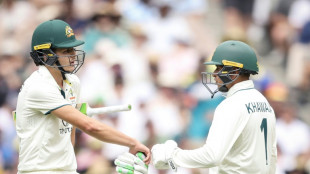

Blood and fears: The military medics of Bakhmut
The armoured evacuation vehicle screeched to a halt to the sound of artillery fire and unloaded a group of reconnaissance soldiers whose mission went bad in Bakhmut.
Some lost their balance stumbling over the doorstep of a shelled-out building posing as the closest field hospital to the flaming front.
Their worn uniforms were torn open to expose wounds or help the dirt-covered men breathe. A few leaned against their rifles or slid to the ground with their backs against the wall.
None said how many friends they had just lost on the killing fields of Ukraine's brutal battle in Bakhmut.
Their unit was probing the Russian defences when it was detected and exposed. Enemy tanks opened fire at point-blank range.
The concussed soldiers waved their arms and swore while reliving the ensuing chaos as they waited for their medical assessment tests.
A team of medics -- some still in slippers -- silently pulled out shrapnel from the wounded as more soldiers were stretchered in.
The intensity of the medics' shift is a window into the mounting emotional and physical toll for Ukraine's medical staff who have played a vital but behind-the-scenes role for 17 months of Russia's full-scale invasion.
"I have reasons to exact revenge on the Russians," surgeon Kirilo Orlov said after saving one of the troops.
"I mean real revenge. I have lost too many acquaintances and friends," the 40-year-old said.
- Jitters and shock -
Orlov's field hospital stands in a ghost town whose ground is a tangle of debris and whose air shakes from incessant blasts.
The military medics take turns smoking at an open doorway facing away from the Russians and almost never step a foot outdoors.
Some pull on flak jackets and dash to an armoured vehicle to rescue more soldiers when the orders come.
Automatic rifles lean against corners and walkie talkies relay the sounds of war.
Sergiy Podolyan sat alone in the hallway with sweaty palms.
"This is something new," the fresh-faced 27-year-old said on his first day at the front.
"We had some military training at a shooting range so we got a bit used to the blasts," he whispered under his baseball cap.
"But not like this."
- 'Fighting smarter' -
The medics have less work now that Ukraine's forces have abandoned their defence of Bakhmut and are trying to ensnare it in a pincer movement from the west.
"We have one-third the number of cases we did in February or March," doctor Dmytro Urakov said.
"We are fighting smarter now," the 42-year-old added before slinging a rifle over his shoulder and walking off to get some rest.
But the precision attacks along Bakhmut's flanks still run into stiff Russian defences and minefields.
Battles over strategic heights -- often little more than a bumpy hill -- can last weeks.
The wounded soldiers were too fresh off the battlefield to think of anything else.
"They want to go back out there," nurse Galina Slobodyan said with a compassionate smile after bandaging a soldier's arm.
The soldier had just gruffly rejected Slobodyan's advice to get more treatment at a real hospital away from the front.
"I can't tell them no."
- 'To kill a medic' -
Slobodyan herself was drawn to the war.
The 23-year-old was working as a hairdresser in Poland when Russia invaded 17 months ago.
She rushed back to Ukraine while millions of others were flooding out.
"You sit abroad, make money, but what's the point?" she asked, while shyly scratching a tattoo on her neck.
"I wanted to be useful, so that I could be of at least some help."
Most of the wounded had been cared for and the medics were going back to scrolling their mobile phones to unwind.
Slobodyan was giggling with Podolyan in a corner to try and relieve the rookie's stress.
But surgeon Orlov sat in stormy silence next to the operating table and stared off into space.
A new medical team would soon be going out to what Ukrainians call "point zero" -- the very epicentre of fighting -- to rescue more wounded men.
Orlov said each one of his medics was a target for the Russians.
"It's not like World War II, when you have a red cross and they don't shoot at you," he said.
"On the contrary, they will shoot. For them, this is a primary target, to kill a medic."
M.Furrer--BTB




